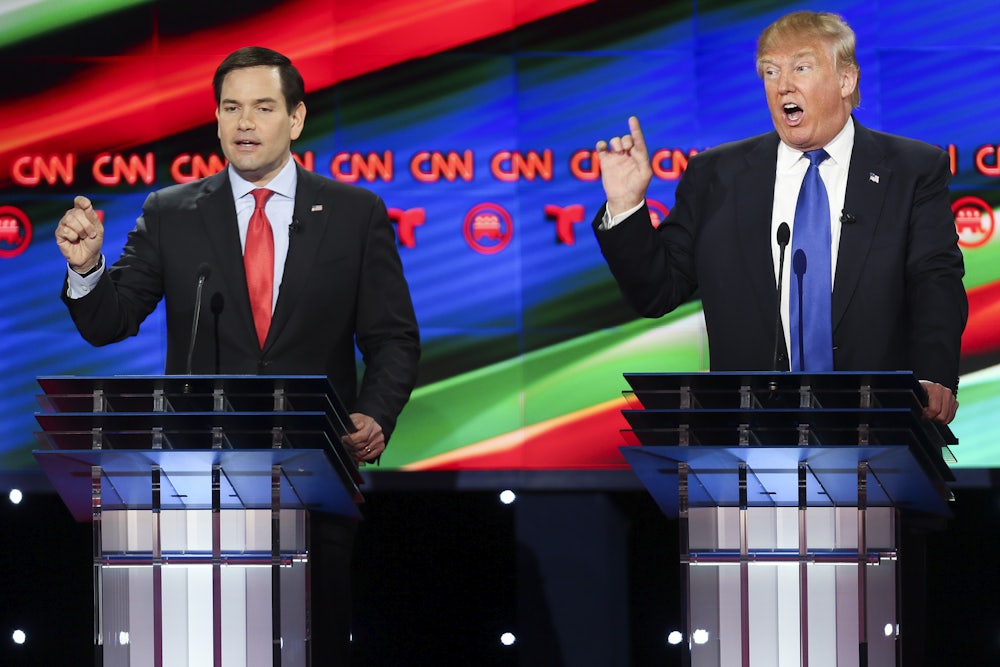If you scroll back through social media, a couple things about the commentariat’s real-time reaction to Thursday night’s pre-Super Tuesday Republican primary debate stand out above the rest.
1. Widespread agreement that Ted Cruz and Marco Rubio, but especially Rubio, were finally able to meet Donald Trump head on, and knock him off his game.
2. Notwithstanding the notorious problems with predicting how the public will respond to debates (and a political season defined epically by failed prognostication), the conservative commentariat barely bothered pretending they weren’t going to anoint Rubio the runaway winner before the debate even reached its second half.
But if you go back and rewatch the debate, the most conspicuous thing is more thematic. By (for once) subjecting Trump to repeated and sustained attacks, Rubio and Cruz conducted a real-time experiment to test which kind of attacks work against Trump and which kind do not. Or, at least, to determine what kinds of attacks actually faze him. The results are pretty clear—the only question is whether the right can adequately grapple with the implications of them.
To absolutely no effect, the Republican Party and its conservative movement allies have spent months and months—and a fair amount of advertising money—spreading the message that Trump is actually a liberal. The kernels of truth in their claims are undeniable. Over a long business career, Trump has sprayed opinions and campaign cash like buckshot. It’s easy to strip some of these statements and donations from context to create a caricature of Trump as an unreconstructed liberal Democrat.
This strategy had several obvious flaws, beginning with the fact that very few of Trump’s issue positions as a candidate can be construed as liberal. He supports regressive tax policy and intolerant immigration policy, to say nothing of his political affect, which is more brutish and politically incorrect than many conservative talk-radio hosts’. Criticizing Trump for attacking crony corporations, or for objecting to the idea of people dying due to lack of health insurance, may only help him.
What Rubio and Cruz demonstrated last night (and what Rubio continued demonstrating, somewhat haltingly, today) is that the secret to getting under Trump’s skin isn’t to call him a liberal but to mock him, or call him a crook, and to not stop (as Jeb Bush did so frequently) after a single pop to the nose.
The downside of this revelation, though, is that it leaves open the question of how a crooked, risible demagogue managed to commandeer the Republican Party, almost without trying.
Some conservatives no doubt criticize Trump’s heterodoxies because they believe in orthodox conservatism. But others have cottoned to the Trump-is-liberal line because it absolves the movement of responsibility for creating him. Much like civil-rights movement revisionism—pretending Republicans are the true and rightful heirs to Martin Luther King’s legacy—is often spun to absolve the right of its complicity in structural racism.
Accusing Trump of being a liberal isn’t effective, but it serves a special pleading purpose that harping on his genuine weaknesses doesn’t. To the contrary, Cruz and Rubio’s new, and possibly more effective, line of attack raises obvious, critical questions that may force conservatives to reckon with the Trump phenomenon in earnest rather than blaming others for it, or pretending it doesn’t exist.
